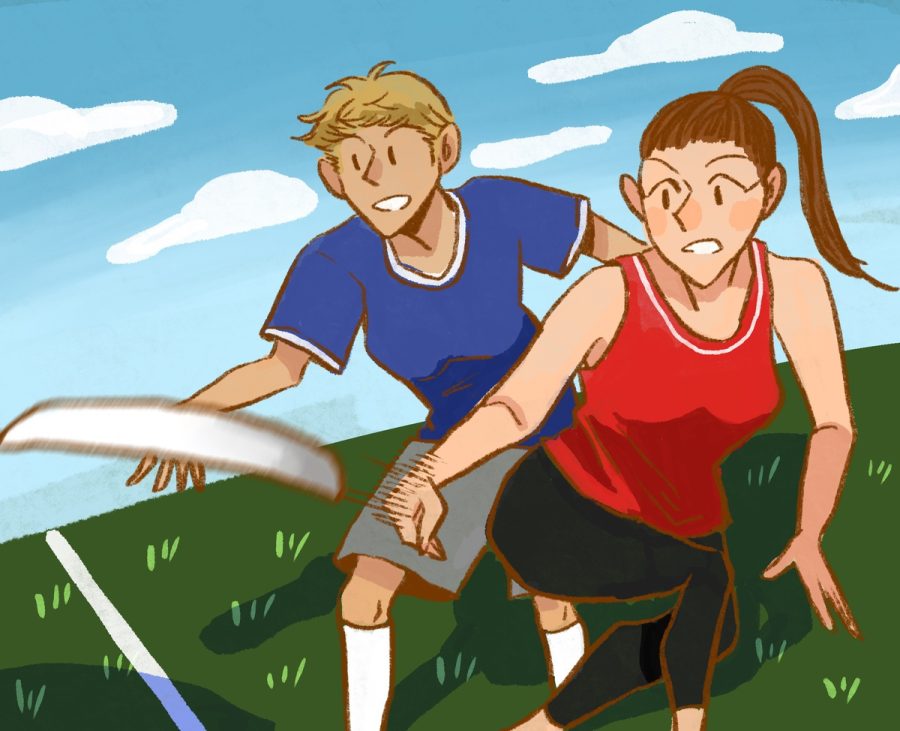Women’s, non-binary ultimate team advocates for equity in sports
January 9, 2023
As the captain of the UT Women’s and Non-Binary Ultimate Frisbee Club, Julia O’Connell said she has always been concerned about fairness in her sport. When she saw gender equity might be under threat by a change in leadership, she knew she had to act.
The team released a statement on Nov. 21 in protest of local nonprofit Austin Ultimate’s decision to outsource youth coaches and coordinators to Austin Sol, an organization that centers around men’s ultimate.
Thirty UT players and coaches signed the statement advocating for greater inclusivity and gender equity in the organization’s youth leagues.
“It ends up being just women advocating for women,” O’Connell, a management and international relations and global studies senior, said. “If we’re not there advocating for ourselves, oftentime (the Ultimate community) won’t consider it. They don’t understand how women might not feel as welcome to show up to something if it’s titled ‘Sol Camp,’ which inherently implies it’s for men.”
UT WNB also said if Austin Ultimate does not repeal its partnership decision, they want Austin Ultimate to take concrete steps to ensure fairness. Requests include communicating an actionable plan to promote equity, implementing an accountability framework and protecting non-binary, transgender and other gender-diverse athletes’ right to play in youth leagues, according to the statement.
Patrick Christmas, Austin Sol general manager and former member of the Austin Ultimate Board, said Austin Sol will instead work to amend and expand on “existing policies to cover leagues.”
“We worked well with the women’s community of Austin in the past and would do so in this event and in the future,” Christmas said. “We certainly try hard to do everything we can to include (players).”
WNB ultimate captains, including O’Connell and Club President Karina Kumar, authored the statement which advocates for a partnership with co-ed youth organization TUSC365 and owner Colleen Kepner over Austin Sol.
“Austin Ultimate has reached out to me, even though they haven’t acknowledged the statements made by these female and non-binary teams,” Kepner said. “I’m continuing to come to the table with them and talk through it. There will still need to be a lot of repair, to undo or at least continue to make pathways in our sport.”
In 2017, players organized a boycott of the American Ultimate Disc League (AUDL) to protest for equal representation of men and women in the organization, according to UltiWorld. Later in 2019, players formed the Premier Ultimate League (PUL), which aims to increase visibility for female and non-binary players.
UT WNB leadership took inspiration from The Austin Torch, Austin’s professional female ultimate team under PUL, which released a separate statement in protest of the partnership on Nov. 14. Jaime Estes, a Torch player and coach for UT WNB who worked with Kepner over the summer, said signing her name to both statements was an easy decision.
“Like with all sports, there’s always been limited access for girls and non-binary youth,” Estes said. “It’s even more prevalent in a newer sport still trying to gain traction. Colleen does a really good job breaking down those barriers. There was no doubt in my mind my signature was going on (the statement).”
In response to UT WNB’s statement and general outcry, Austin Ultimate hosted a Town Hall on Dec. 17 to discuss their partnership with Austin Sol. Mindy Radike, Torch player and former Melee captain, attended the meeting.
“To me, there wasn’t a lot that was accomplished policy-wise during the town hall except for giving people the space to air their grievances in a civil and productive way,” Radike said. “They told us they had reached a resolution between SOL and TUSC, but at the same time they didn’t really reveal what the resolution was.”
Players for Melee and Mayhem, UT’s national and regional teams, said they will continue to fight for equity in their sport.
“We have an obligation to share our perspective, experiences and how the experiences of other girls in the Austin area would be affected by this decision,” O’Connell said. “It’s important for women to advocate for themselves, because if we don’t, who will?”



